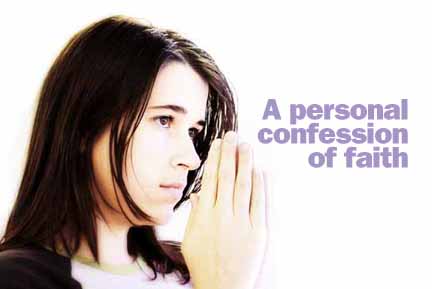Canadian Mennonite
Volume 10, No. 16
August 21, 2006

 |
 |
In April, Mike Perschon, long-time youth pastor (now at Holyrood Mennonite Church in Edmonton), gave a passionate sermon on how the church needs to go about reaching its youth and the generations to come. We present it to you, along with a spiritual confession of faith by “young prophet” Sarah Johnson and a feature interview with Josh McDowell (author of Evidence That Demands a Verdict), as a way of spurring thinking and church discussion on this vital task for our church. Ed.
As a church we struggle with the idea that having spiritual children changes our lives.
What’s the future for youths in our conference? It’s a repeated question. Why don’t the youths want to come to our church? Why don’t the youths stay in our church? The real question, though, is, “Were they ever here?”
When I first got to one church that I worked for, I had people coming up to me within the first two weeks asking when are we going to see some baptism services. And I’m thinking of the Bible study I had with these kids the other night. I asked them some basic questions about Christianity and they couldn’t tell me anything about their faith. And I’m thinking, I’m not sure they’re Christians so I’m not putting them in any water or splashing anything on top of them until I know for sure!
We’ve got this model of youth and children’s ministry where we usher them out of our worship services part-way through. It’s half time—the sermon part is coming—and what are we telling them? It’s going to get so boring! We are telling them that you go there and do your thing and we’ll stay here and do ours.
And we do the same thing with youth ministry. We give youths their own pastor. And we call them pastor, but what we really mean is “fun director.”
Churches say they want their youth pastors to give Bible studies. No, they don’t! I did a whole semester of Bible study this one time—and they were creative Bible studies and they were interactive Bible studies, Bible studies they should have really got—and you know what happened? At the end of that the parents came to me and said, “”Our kids aren’t having any fun anymore.” I knew then that my job was fun director.
We say we want young people in the church, that we want them to be part of our church. But I’m not fully convinced that we are ever really ready for what that means.
We say we want youths to become involved And what that means is we would like them to usher. We want them to work in the sound booth. We want them to maybe read the Bible.
But if one of them decides—and I know this from experience—that they are going to be a musician in the church, they are told they are going to have to learn to play some hymns.
I said, “Just as soon as some of those older folks learn the choruses and lead them, I’m willing to go to the young people and tell them that they can learn some hymns.”
But I don’t expect that from my seniors. I don’t want them to do choruses; it’s painful for them and it’s painful for me. The youths doing hymns is that kind of painful.
How not to welcome youths
I was working in a church this one time and a young boy came out to the service; he would have been in about Grade 6. By himself he just showed up one morning. And he plunked himself down on the pew.
The time comes around for us to sing—and in this particular church there were numerous books, including the Bible—and when it came to the singing time he went for the Bible. He wasn’t sure what to do; he had no idea what he was doing in church and he was just trying his best to sort of figure it all out. And people just kind of looked at him and wondered at the novelty—what a curiosity!
He came up to my Sunday school class and we were reviewing a popular film and its relationship to Scripture and things he might be able to learn about Christian life. And he enjoyed himself so much that he came back the next week and he brought his brother and his sister.
During our service we had begun to serve coffee and pop. And the kids drank lots of pop. We sent those kids home wired every week to their parents who weren’t coming with them.
At the church’s next business meeting somebody raised the issue about the young children who had been coming and drinking so much pop. And I’m thinking on the list of things that we have to care about as a church, this is on page 200. But suddenly we are talking about the integrity of the carpet and what happens if one of those kids spills some pop on the carpet!
What happened was that the parents of those kids got a phone call: Please don’t send your kids until you’re willing to come with them.
Welcoming the ‘generations to come’
I got an e-mail at one church that started out with, “I remember the days when we would come to church and it was quiet and peaceful and we’d meditate before the service… and now we got these kids in the church and they are making all this noise.” And then at the very end of the e-mail, “I don’t understand why we are losing our young families.”
I thought, “Did you read the first part of your letter?”
Genesis 9:12 says God’s covenant with Abraham was for all “generations to come.” That exact phrase—“generations to come”—is found 39 times in the NIV. But if you extrapolate its meaning, we see future generations shows up more than 100 times. It seems to be important to pass the torch to the next generation.
Psalm 22 says that not only the future generation will be told about the Lord, but they will proclaim his righteousness to a people yet unborn. What our fathers have told us, we will not hide them from our children. We will tell the next generation the praiseworthy deeds of the Lord, so that the next generation will know them—even the children yet to be born!
In the pastoral epistles to Timothy, the torch is passed from Paul, who had started a ministry, and now is passing it on to someone else.
In Mark 10:14, Jesus tells the disciples to “let the little children come to me and do not hinder them.” But what do we do most of the time with the way we communicate the gospel? We hinder them. We use a lot of difficult words—even for adults.
Somebody has said the church is always one generation away from extinction. How do we turn it around? We have to think about that when we talk to a child, that we change the way we speak.
I can’t answer the question, “Why is the sky blue?” with, “Well, the sun’s rays refracting off the ozone layer causes a change in the prismatic make-up of your ability to perceive through your optic nerve.” No. To a child, a suitable answer is, “Because God thought it was pretty.”
We must make sacrifices to bring the gospel to the next generations. I believe the key is Romans 14. That passage says that the stronger brother is supposed to put up with the failings of the weak—the young and arrogant, like I was. Now I’m old and arrogant, but the young people and the children have put up with whatever we throw at them because church isn’t supposed to be fun! It’s supposed to be a place where we learn values and how to behave properly in church.
People of God, now is the time to be willing to minister to the generations who are yet to come. But take heart in this because I truly believe that if we invest in the youths in the next generation, they will return the favour.
It will not happen immediately. You will have to endure possibly spilled grape pop, but at some point God is faithful. He will open in their hearts the care and the love for the people who have served them. They will begin to appreciate the tradition that they stand upon if that tradition will appreciate them now.
As Jesus, washing the disciples’ feet, said for us to love each other in a servant manner. We have to be able to say, I am going to totally give it up! I’m going to give up my hymns! I’m going to give up my quiet service! I’m going to give up my orderly worship! I’m going to let it fly! And I believe that God is going to give it back to you.
The people of God must build an ethos that serves the generations yet to come, so they can hear and they can know that the torch will be passed.
 |
 |
About two years ago I lost a lot of faith. I cannot explain why or how this happened, only when. Suddenly believing just did not make sense anymore. My experience is far from unique, especially among my young adult peers, although it was personal and powerful. Unfortunately, it is also my experience that feelings of doubt are something we do not often discuss as a community of faith.
Eventually, I decided I was focusing too much on what discourages me with regards to Christianity and the church:
• What I don’t believe;
• What I don’t understand; and,
• Why I don’t want to identify myself as Christian.
I set out to articulate the positive dimensions of my faith:
• What I do believe;
• Why I do call myself a Christian; and,
• Why I am active in the church.
The confession that emerged is not so much about answers, but the way in which I hope to ask questions. It is not about a lack of belief, but, instead, it is about a new way of believing. It is a confession of the moment. It is flexible and open to change as more is doubted, more is searched for and more is lived out. Openness to revision is the foundation of this confession of faith.
I cannot tell a dramatic story about how my faith was reborn and I am glad of that, because I cherish the search and the brief moments of faith I have now more than all the confidence and security of the past. I would never want to go back.
A personal confession of faith
I used to believe in God, but now more than that I believe in seeking God.
I used to believe in Christ, but now more than that I believe in following Jesus.
I used to believe in the Spirit, but now more than that I believe in waiting for God’s inspiration.
I used to believe in heaven, but now more than that I believe in creating heaven on earth.
I used to believe in salvation, but now more than that I believe in regeneration.
I used to believe God created the earth, but now more than that I believe in exploring the complexity of creation.
I used to believe God created humanity, but now more than that I believe God works through human nature.
I used to believe in the Bible, but now more than that I believe in learning from the experience of others.
I used to believe in prayer, but now more than that I believe in sighs too deep for words.
I used to believe in worship, but now more than that I believe that life is service.
I used to believe in the church, but now more than that I believe in human solidarity.
I used to believe in baptism, but now more than that I believe in commitment and loyalty.
I used to believe in communion, but now more than that I believe in community.
I used to believe in love, but now more than that I believe in loving everyone always.
I used to believe in hope, but now more than that I believe in living with optimism.
I used to believe in faith, but now more than that I believe in the necessity of doubt.
I used to believe in truth, but now more than that I believe in the quest for knowledge.
I used to believe in knowledge, but now more than that I believe in mystery.
I used to believe in true and false, but now more than that I believe in paradox.
I used to believe in black and white, but now more than that I believe in colour.
I might not believe in very much, but more than that I believe that little is enough.
I might believe that little is enough, but more than that I believe there is always so much more to discover.
Rebuilding the foundations
 |
Speaker and author Josh McDowell never intended to be a defender of the Christian faith. In fact, as a skeptic, his goal was just the opposite—until he learned that the Bible was the most historically reliable document in all antiquity. His discovery that Christ’s claim to divinity was true changed the course of McDowell’s life forever. He has since spoken to more than 10 million youths in 84 countries and on 700 university and college campuses. His new book explores the impact of a cultural view of Christianity that has distorted how church youths understand God. McDowell was interviewed by Canadian author and humorist Phil Callaway.
Phil Callaway: I’m reading The Last Christian Generation. Isn’t the title a little sensational?
Josh McDowell: Yes, but with substance. I’m trying to raise the alert level. I’m saying we’d better wake up. I wish to God I never had to write this book, but over the last 10 to 12 years I’ve sensed trends and realized that as a church we are in trouble. This is a definitive statement on the condition of the church and the optimistic solution to it.
The problem is not with the kids; it’s with their parents and leaders. It’s not about North America; it’s about the church. In North America we saw the last Christian generation years ago. But now we’re seeing the last Christian generation within the body of Christ.
Still sounds sensational.
McDowell: It’s a crisis. Right now within 12 months of high school graduation over 80 percent of our kids are walking away from the church. If we keep doing what we’re doing, it will soon be 90 percent.
According to [American pollster George] Barna, 65 percent of our churched kids either suspect or believe there is no way to tell which religion is true. In 1994, half of evangelical Christian kids said, “There is no truth apart from myself.” Now, it is a staggering 91 percent.
If there is no truth, then you cannot say that Jesus Christ is the Son of God; only that he’s a son of God. Francis Schaeffer said that our culture had become post-Christian. I believe now he would say it’s become anti-Christian.
You say that only 33 percent of churched youth say the church will play a part in their lives when they leave home?
McDowell: In other generations it’s never been lower than 55 percent. If we don’t make some drastic changes, once this generation marries and has children, they will not return to the church the way the Buster generation has—to a certain extent.
What surprised you the most about the statistics in this book?
McDowell: The effect of relationships upon a child’s belief system. It blew my mind.
Why are our young people turning their backs on the church?
McDowell: They’ve been raised with programs and events, not with a process-driven ministry where the Word of God was internalized into their lives. We have a lack of relationship with mom and dad, with leaders in the church, with significant adults in their lives.
What engenders beliefs? It’s our relationships. What causes a young person to want to believe your truth and follow it? It’s relationships.
In Psalm 26:3, David said, “I’ve been constantly aware of your unfailing love and I have lived according to your truth.” If he had not seen that unfailing love, he would not have lived according to the truth.
Research shows that parents have a 300 percent greater influence on a child’s spiritual or theological belief than their pastor or youth pastor. So a lot of it comes down to the parents.
In Psalm 86, David prayed a prayer that every parent in the church would hope their child would pray: “Teach me your ways, Oh Lord that I may live according to your truth.” Now what is the motivation for that? David said, “For your love for me is very great.” That’s why David prayed that prayer. That’s why he wanted to believe.
Belief in the truth followed the relationships. It’s the same today. If kids do not have those relationships at home, it will have a direct effect on their belief system.
What are some practical things churches should address to change things?
McDowell: We must understand the condition of the church or our solution will miss the bull’s eye.
Second, we must realize we’re losing our kids—not because they’re not hearing truth—but because we’re not building relationships with them.
Third, we can’t raise children programmatically. We’ve got to raise them with process.
There are three dimensions to biblical truths:
• God is passionate about his relationship with us and a child needs a relationship with the truth-giver.
• Then, is that truth credible? Is it truly true? Young people have to be convinced of that.
• Third, how does that truth affect me in my experience and relationship with others?
Jesus said, “You will know that they are my disciples,” not by their convictions, but “by their love for one another.” Truth was given to be lived out in relationships, but we have failed to show kids how that can happen.
When you look at these things, do you ever get a sense of hopelessness?
McDowell: Yes, I really do. When we do a pastors’ briefing and the overwhelming majority of pastors sit there and take no notes. If ever there’s a time when I just want to throw up my hands and walk away, it’s then.
My heart goes out to senior pastors. They’ve got to be everything to everyone and still try and hold their families and marriages together. I do everything I can to inform them what’s going on and trust God the Holy Spirit to do his work. My optimistic approach is that if we can get back to teaching truth as a relational process, we will have a revolution.
What advice would you have for parents?
McDowell: Build a relationship with your kids. God’s Word without relationships leads to rejection. Rules without relationships lead to rebellion. You can be the greatest teacher of truth in the whole world, but if in the depths of their hearts, your kids do not believe that daddy loves them, they’re going to walk.
You’ve also got to be able to show that “truth” is credible. I can hardly ever find anyone, including senior pastors, who can give me one intelligent reason they believe the Bible is true or historically reliable, or why they believe Jesus Christ is the Son of God.
With your children you’d better be able to explain to them why the resurrection is true, why the Bible is true and historically accurate, why you can trust it.
What are you hoping this book accomplishes for the kingdom?
McDowell: I hope God will use it to wake up the church. We’re asleep. I want to see a revolution take place that will take us back to a biblical paradigm of truth, where pastors and parents will start teaching relationally. If we do that, I guarantee we will see a change.